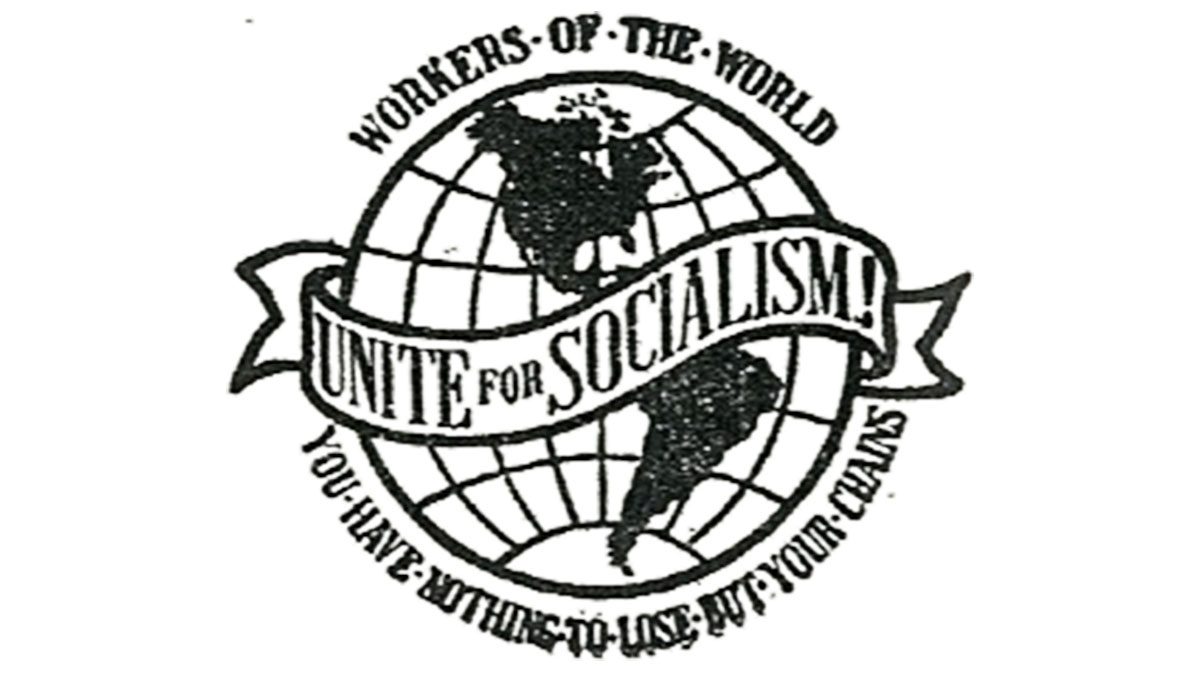From the July 2016 issue of The Socialist Standard
It is now just a century since the World Socialist Party established itself in the USA. Other such organizations arose at about the same time in Australia, New Zealand, and elsewhere, from similar circumstances: SPGB comrades became world travelers to escape conscription in The Great War, spreading knowledge and understanding of the case for socialism as they went. In the Twenties and Thirties these early parties took steps to form what we now call the World Socialist Movement.
In Detroit, Michigan, British ‘slackers’ Moses Baritz, Adolph Kohn and others conducted a series of classes on Marxian theory at Duffield Hall. Out of these classes, some 43 individuals, 19 of them belonging to the Michigan section of the “Socialist” Party of America (SP of A), held a conference on 7 July 1916 at which they voted to form a revolutionary socialist party based on the SPGB’s object and principles. They chose to name the organization The Workers’ Socialist Party, since the SP of A objected to ‘Socialist Party of the U.S.’
Among these original founders of the WSP(US) were Bill Davenport, its first Secretary; Bill Gribble, a Canadian, its first Organizer; Isaac Rabinowich, usually called simply ‘Rab,’ around whom Boston Local was to form; and Walter Green, influential in establishing a Local in New York.
With the infamous Palmer ‘Red raids’ of 1919, the group felt it prudent to reincarnate themselves as the Socialist Education Society. Not till 1931 did the SES Locals in Detroit, New York and Boston reconstitute the Workers’ Socialist Party.
Two good sources for early WSP history are Bill Jerome’s in the Western Socialist (No 4, 1966) and more comprehensive account, Role-modeling Socialist Behavior: The Life and Letters of Isaac Rab, by his grand-daughter Karla Rab (November 2010 (Lulu.com); available on Amazon.com) from which much of this present article is drawn.
The Thirties, Forties and to some extent the Fifties were the years of greatest sustained activity for the WSP(US). During WWII, many comrades were drafted, and Party Rules prevented members of the Armed Services from being in the organization; but when draftees returned, they usually rejoined. It was a time of ‘keeping the ‘social’ in ‘socialism’’ as some comrades put it: party socials at Headquarters and in comrades’ homes were almost weekly events.
In 1947 the Workers’ Socialist Party became the World Socialist Party, thanks to a push from the Trotskyite ‘Socialist’ Workers Party. The postwar ‘anti-communist’ hysteria brought a McCarthyist makeover of the Palmer period; it was, if possible, still more artificially contrived — but with the same chilling effect. The WSP’s activities drew fewer newcomers as a result. There were enough comrades to keep things going, although membership was declining.
SPGB Comrade Gilbert McClatchie (Gilmac) paid his first of many visits to the USA in 1954. He got to meet East Coast comrades in Boston, and also visited California on that trip.
Out West, Jack MacDonald was propagating socialist ideas from his bookstore in San Francisco; other Canadian expatriates, like Bill Hewitson (Winnipeg) also turned up in California over the years.
In Los Angeles, W.Z. Miller, Frank Neale, Fred Evans, Walter Henderson and others had formed a Local, sometimes meeting in MacArthur Park. Bill Pritchard, one-time editor of the Western Clarion and a famous co-defendant at the Winnipeg General Strike trial who tied up the proceedings with an epic filibuster, was to become involved with Local Los Angeles as well. A member of the old Socialist Party of Canada (but who left the socialist movement when that SPC expired in 1926), Pritchard found his reputation had preceded him; he was allowed to stay in the U.S. after 1938 on a promise not to ‘join any organizations.’ And he kept a low profile until the Sixties, when he officially joined the WSP and began writing articles for the Western Socialist. (In 1939 the ‘new’ SPC had moved the WS to Boston to evade the wartime censorship.)
During Gilmac’s later visits and those of other British comrades following his example, comrades in Boston and elsewhere were always able to arrange speaking opportunities for them, often on the radio where there was good exposure. Cyril May, Jim D’Arcy, Adam Buick (who spent ten weeks with the Boston members in 1964, including an excursion up to the SPC’s Toronto and Montreal Locals) and many others came and took advantage of American propaganda opportunities during the 1950s, 60s and 70s. Tony Turner also visited, following his resignation from the SPGB.
By 1966, Johnson’s escalation in Vietnam was reaping the whirlwind in the form of a vociferous and growing anti-war movement, adding to the Civil Rights struggle already engulfing the Establishment. An ongoing debate arose within the party around how to respond to the Civil Rights movement: of course, the right of African Americans to vote was a cause that socialists must support — but was the fight for civil liberties ultimately just an attempt to make capitalism work better? Broadly speaking, Rab argued, it was not, but the drive to establish equal rights for all before the law was essentially a reform, because it did nothing for establishing real equality among all people. It was an illusion to think Black capitalists had common interests with Black workers.
Internally, the party was having a hard time finding members to carry out basic administrative tasks, but it was forging ahead again: a minor renaissance was taking place, with membership growing during the late Sixties in both numbers and enthusiasm. Promising new members like Bill Jerome and Steve Butterfield (who wrote as Stan Blake) joined the party. Both wrote for the Western Socialist.
Enough new members joined in the Boston area to revive the LAC, or Local Administrative Committee, which consisted of five younger members (Steve Butterfield and his wife, Connie; George and Karla [Rab] Ellenbogen, and Bill Jerome) and oversaw all activities within the Boston Local, mainly indoor meetings, outdoor meetings held on Boston Common, covering protest meetings, and so on.
The older members like Rab, Harry Morrison and George Gloss, all of whom spoke often on the Common, tended to concentrate at the NAC level, but younger members like George Ellenbogen and Bill Jerome, for instance, might also find their way onto the National Committee. Jerome, elected to the NAC, was quickly co-opted onto the Editorial Committee as well to replace Len Fenton. This was symptomatic of a party in which too few members were having to wear too many hats.
Aware of this problem, the WSP(US) back in 1950 had moved its National Office from Boston to Detroit in an attempt to free up the Boston comrades to do more propaganda work by reducing their administrative tasks. For five years Detroit comrade Irving Canter served ably as National Secretary, but to no avail, and the National Office returned to Boston.
Annual conferences were sometimes rowdy; one comrade from Glasgow returned home with the alarming impression that the WSP(US) was about to implode from infighting. But these fireworks really only registered a predictable frustration among comrades who perceived that very important tasks were not yielding expected results.
By the late Sixties, most party activity was occurring in Boston. New York Local, which in the early years had been the center of activity, had lost its fire. Years went by when no new members joined. Even Sam Orner, an old Wobbly who had led the 1934 taxi drivers’ strike, could no longer inspire anyone apart from his family to join the struggle for a better world. Orner argued that New York Local was not adequately publicizing its existence, but his was a voice in the wilderness.
The mid-Seventies brought one golden moment: PBS Channel 44 offered a half-hour of prime time free on ‘Catch 44’ to any community group requesting it. The party jumped at the chance, producing three videotaped segments. The first two used a “talking heads” format; the third was a dramatization.
By the end of the 70s, Local New York was defunct. Local activity in Boston was dwindling, too. The World Socialist Party (US) now found itself a party of members at large, placing its organization on a tenuous national basis for the first time in its history. In fact, it was a member at large who did arguably more work for socialism than any other other American comrade during that period. Starting in 1976, Sam Leight, a real estate broker in Tucson, Arizona ran a series of radio broadcasts from which he generated two books:World Without Wages (Money, Poverty and War!) and The Futility of Reformism. (Earlier, Leight had also participated in the NAC as a member at large.)
Late in the Seventies, the Western Socialist dropped to two issues a year, ceasing publication entirely in 1980. The West Coast’s already sporadic activity grew faint. Boston was now the only active center left, yet this was precisely when things took a turn for the worse. From 1973 on, Rab suffered from Alzheimer’s Disease; on New Year’s Eve, 1986, he finally succumbed to pneumonia. The party, doubting its ability to make good use of a bequest from a member, voted to send the money to the SPGB. And in 1982 developers chased the WSP out of its fourth headquarters at 295 Huntington Avenue.
It was a bleak moment for the entire party; the NAC’s administrative functions ceased to be carried out, and the meetings (now held in a comrade’s home) became those of a correspondence committee, its Minutes an occasional ‘Report to the Membership.’
Then in 1986, a young recently-joined Michigan member, collaborating with an SPC member from the Toronto area, brought out a new party publication, the World Socialist Review — a shoestring successor to the defunct Western Socialist produced on an office photocopier. After the second issue, Aaron Feldman, the new National Secretary, asked the present writer (a desktop publishing enthusiast) to see what he could do with it, and so a morphed WSR revived the SES tradition of an ‘occasional’ journal. Boston-area members (Fenton, Mike Philips, Ken Stewart, Karla Rab and myself) did stage a minor rally toward the end of the 80s, in tandem with a speaking tour by SPGB comrades Steve Coleman and Richard Montague; but not until nearly a decade later, in 1997, did a group of us set about re-establishing a functional NAC as a first step toward bringing the party back to life.
The new NAC has had its ups and downs, to be sure, although the continuous revolutionizing of communications and computer technologies has opened up once unimaginable opportunities. The WSM has embraced the Internet, with all the companion parties having linked Websites, blogs, social media and so on. The World Socialist Review, thanks to the good offices of Comrade Morgan Miller on the West Coast, was transformed by referendum into a ‘print-on-demand’ yearbook — a very workable concept that bridges the gap between print and electronic publishing. This should soon allow the WSP to make better use of its resources — although at this writing, only the first such yearbook has been produced, and a second is planned.
And so, after a century, even if the World Socialist Party is not as active as we have been, we are still working to make socialists. Still lacking, unfortunately, is a conscious, political majority of socialists eager to move society on to the next phase of social evolution.
Ron Elbert



